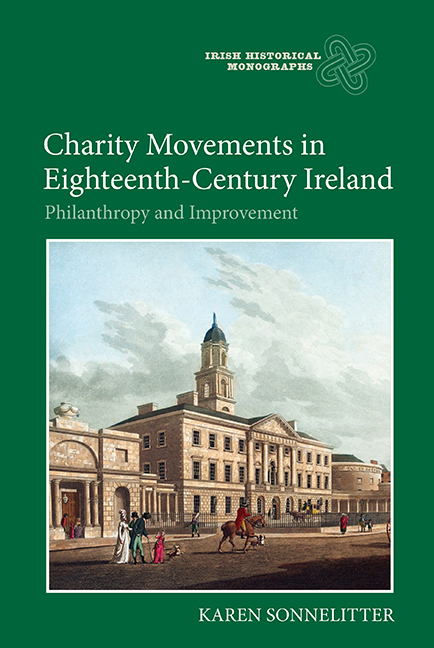Book contents
- Frontmatter
- Dedication
- Contents
- List of Figures
- Acknowledgements
- Abbreviations
- Introduction: Ireland in the Eighteenth Century: The Case for Improvement
- 1 ‘The Worst in Christendom’: The Church of Ireland and Improvement
- 2 Education and Charity: The Incorporated Society for Promoting English Protestant Schools in Ireland
- 3 To Cure and Relieve: Voluntary Hospitals in Eighteenth-Century Dublin
- 4 Improvement as Philanthropy: The Royal Dublin Society
- 5 ‘The Benevolent Sympathies of the Female Heart’: Women, Improvement, and the Work of Lady Arbella Denny
- 6 National and Local Government and Improvement
- Conclusion: Philanthropy and Improvement in Eighteenth-Century Ireland and Beyond
- Bibliography
- Index
4 - Improvement as Philanthropy: The Royal Dublin Society
Published online by Cambridge University Press: 11 May 2021
- Frontmatter
- Dedication
- Contents
- List of Figures
- Acknowledgements
- Abbreviations
- Introduction: Ireland in the Eighteenth Century: The Case for Improvement
- 1 ‘The Worst in Christendom’: The Church of Ireland and Improvement
- 2 Education and Charity: The Incorporated Society for Promoting English Protestant Schools in Ireland
- 3 To Cure and Relieve: Voluntary Hospitals in Eighteenth-Century Dublin
- 4 Improvement as Philanthropy: The Royal Dublin Society
- 5 ‘The Benevolent Sympathies of the Female Heart’: Women, Improvement, and the Work of Lady Arbella Denny
- 6 National and Local Government and Improvement
- Conclusion: Philanthropy and Improvement in Eighteenth-Century Ireland and Beyond
- Bibliography
- Index
Summary
On 28 June 1731 fourteen gentlemen gathered in the rooms of the Philosophical Society of Trinity College and unanimously agreed to form a society for ‘improving husbandry, manufacturing, and other useful arts’.1 The Dublin Society, which upon receiving a royal charter in 1750 became the Royal Dublin Society, differed from other scientific organizations in its focus and methods. Earlier scientific societies primarily sought knowledge for its own sake. From its earliest inception, the Dublin Society sought concrete ways to improve Ireland economically by focusing on encouraging new methods of agriculture and manufacturing and by seeking to use Enlightenment values and new scientific ideas for practical applications. The Society's methods, operation, and ideology demonstrate that its improvement agenda was both practical and philanthropic.
The word ‘improving’ in the Society's statement of philosophy was a significant one. The Dublin Society participated in the broader agenda for improvement in the eighteenth century. In the seventeenth century English settlers had advocated improvement as a way of making Ireland more like England. This meant developing a system of English laws and government, an English-speaking and Protestant population, and English industries and agriculture. The Dublin Society represented a large-scale attempt on the part of the eighteenth-century Anglo-Irish to put those ideas into practice. The Society's agenda was one of practical benevolence and its aims, which intended to produce security and prosperity, were implicitly philanthropic. Throughout the eighteenth century the Society was the ‘principal agent of economic development in the country’, working closely with the Irish government to foster progress in the economy and agriculture. At the same time, the Anglo-Irish membership of the Dublin Society demonstrated an emerging sense of Irish patriotism. Members of the Dublin Society were genuinely concerned for the overall health of Ireland, and saw themselves in stark contrast to many others in their class who sought merely to profit from Irish landholdings while living in England.
The Dublin Society was also an Irish adaptation of the broader concept of enlightened reform. Enlightened reform was an ideology that included initiatives for agrarian renewal, the encouragement of manufacturing and industry, and legal and governmental reform initiatives. Strictly speaking, improvement, the stated goal of the Dublin Society, referred to the practice of rendering land and manufacturing more profitable. On a broader level, however, improvement was about a commitment to change. Improving culture ‘bridged the material and spiritual spheres’.
- Type
- Chapter
- Information
- Charity Movements in Eighteenth-Century IrelandPhilanthropy and Improvement, pp. 99 - 121Publisher: Boydell & BrewerPrint publication year: 2016

